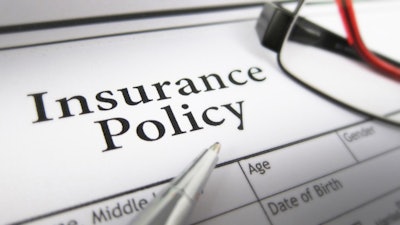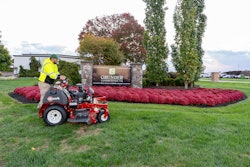 Photo: Source
Photo: SourceIt sounds like something out of a “Three Stooges” short: A landscaping crew leaves the shop in the morning, drives to a private residence and starts to work. As the day goes by, the crew digs up the yard and begins to install new borders, a pond and a patio. Too bad the foreman misunderstood the work order and the crew was working at the wrong house.
Sound far-fetched? Not at all, says Michael Weisburger, president of Weisburger Insurance Brokerage, an insurance company that specializes in coverage for landscaping, pest control and lawn care companies throughout the country. A much more common – and dangerous – situation he often sees involves utility line strikes. Hitting a buried gas or electrical line with a bucket can create major havoc in communities, for both residences and business. “We’ve had situations where houses blew up because of a utility line strike,” Weisburger notes. “Luckily no one was home at the time and no one was killed or injured.”
But the worst accident he’s ever heard of wasn’t filed with his company. A landscaping crew was doing some tree work when a worker got caught in the chipper and was killed. “All that was left of the guy was a finger,” Weisburger says grimly.
Those three accidents succinctly show the difference between a bad day and a truly horrible one. And in each case, having adequate, targeted insurance coverage could be the difference between losing everything and being able to continue to grow your business and provide for your family and your workers’ families.
You may not be particularly fond of insurance. And you may feel that premiums go up unfairly. You may even think insurance is a racket. But if you want to work in the landscaping business, good insurance is a must to protect yourself and your company from disasters like the ones described above.
No claims = lower rates. Or does it?
Ask Weisburger the most common insurance mistake he sees landscaping companies make and he doesn’t hesitate: “Owners let anyone drive their company vehicles. The owners or managers don’t check the driving records of potential employees close at all. And that’s a big mistake because auto accidents are by far the most numerous type of claim in our business. I tell my clients to take a test-drive with anyone they’re going to hire before they let them behind the wheel of a truck or put them on a piece of equipment.”
This advice is invaluable for a small-business owner. It can help you run your business better, hire better people and be more profitable. And Weisburger says it’s exactly the type of advice you should get from your insurance agent and a textbook reason you should depend on a consultant – really almost a partner in your business. At the end of the day, you wind up with a more efficient, safer place to work.
And that, of course, can ultimately lead to a decrease in insurance rates, provided you have a good safety record in your business and are working with a reputable agent. At least that’s the idea.
“That’s a common misconception landscapers generally have,” Weisburger explains. They think as long as they don’t have claims, their rates should go down every year. But the reality is there are factors beyond all of our control that are rising and lowering rates in the overall insurance economy.”
At any given time, Weisburger says there are two different kinds of insurance markets any consumer has to deal with – hard markets and soft ones.
“Insurance rates were rising slowly through the ’90s and into the new century until the 9/11 attacks in 2001,” he says. “And the terrorist attacks were the best excuse ever to dramatically increase insurance rates, which companies across the country did. This is called a ‘hard’ market. And it’s one in which insurance companies suddenly started to make a lot of money.”
But, Weisburger notes, insurance companies have historically had a problem with keeping rates from going up and down in extremes.
“And that’s what’s happened in the years since the 9/11 attacks,” he says. “Things have calmed down somewhat since then. So now, we find ourselves in a ‘soft’ market. Insurance companies know more players have entered the market. More choices means consumers are now are shopping harder for their insurance and looking for better deals. So rates are coming down across the board. The bottom line is that if you’re in a situation where you’ve had very good claims you should be enjoying very good premiums right now. If you’re not, now is a good time to be out shopping for a policy.”
Find an agent and company that specializes in your industry
All insurance companies and the types of policies they offer are not created alike. There are companies that specialize in auto, home and marine insurance. There are also companies, like Weisburger’s, that specialize in landscaping.
“There are many companies out there that specialize in landscaping or lawn maintenance,” Weisburger says. “And you don’t have to invest a lot of money or spend a lot of time to find them.”
If you’re interested in finding a specialized insurance provider, the best place to begin looking is on the internet. Trade shows or ads placed in trade magazines are also an excellent resource for finding specialized insurance coverage. If you don’t feel like you have access to the insurance resources – conferences, trade shows, etc. – Weisburger suggests asking your friends in the business. Call them and find out who they get their insurance from. “We’re 72 years old and we get most of our business that way,” Weisburger says, laughing. The company was founded in 1915 and has been handling these types of insurance risks since 1934.
Once you’ve found a promising company, the bonus is you to get to know them better. “If they’re worth their salt, they spend time in the field with their customers and are proactive in attending trade shows or offering clinics to help people in the industry they serve,” Weisburger says. “And they will have policies tailored for your industry and the kind of work that you do. They’ll understand the specific demands your line of work has and the hazards and risks you face. And they’ll understand how to offer you good, proactive insurance with a goal toward reducing the chance of those risks and hazards turning into some sort of injury or financial loss for your company.”
But what if you have a good relationship with your personal insurance agent and want them to insure your company? Weisburger says you shouldn’t discount that relationship. “Many specialized insurance companies will allow you to go through your local agent and buy industry-specific insurance policies from specialized insurance companies,” he explains. “If your local agent wants to look at your business as well as your home and car, let them. But they have the same responsibility as you do, in my opinion. They need to research your business and your industry, then go out and find a reputable company that specializes in those areas and procure targeted insurance for you from them.”
“A good insurance company is there to help you,” Weisburger notes. “We are insurance experts. But you’re the landscaping or lawn maintenance expert. Be engaged in the process. Ask questions. Meet with your agent at least once a year to review your policy and coverage in depth. And make sure your agent is available at any time to advise you on sudden changes or demands to your coverage. If you do those things, you can turn your insurance into a positive for your company instead of a necessary evil.
Getting the best coverage
- Find an insurance company and agent that specializes in landscaping/lawn maintenance.
- Be engaged in the process; ask questions.
- Make sure your agent is available any time to advise you on sudden changes or demands to your coverage.





